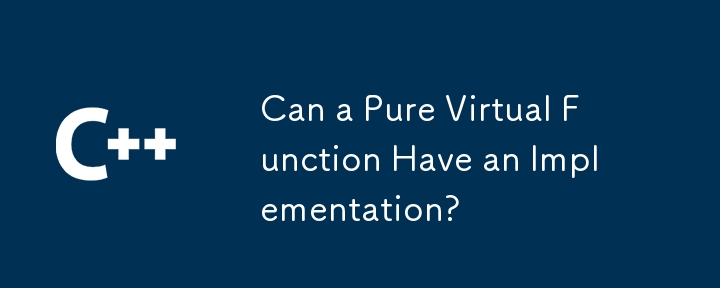Can a Pure Virtual Function Have an Implementation?
Dec 16, 2024 am 01:15 AM
Implementation for Pure Virtual Functions
Despite the common understanding that pure virtual functions lack implementations, certain situations allow for an implementation within the base class. Consider the following code:
class A {
public:
virtual void f() = 0;
};
void A::f() {
cout << "Test" << endl;
}While this code appears to violate the principle of pure virtual functions, it is in fact valid. However, this raises two important questions:
1. Is the Code Valid?
Yes, the code is valid syntax. The base class A can define an implementation for its pure virtual function f(), even though derived classes must also provide their own implementations.
2. Purpose of Pure Virtual Function with Implementation:
There are several potential reasons to define an implementation for a pure virtual function:
- Default Behavior: The base class can provide a default implementation that may be useful for most derived classes. Derived classes can override this implementation if necessary.
- Common Functionality: The base class implementation can provide core functionality that all derived classes should perform. This ensures consistency while allowing for flexibility in derived classes.
- Example Usage: Derived classes can explicitly call the base class implementation by fully qualifying the function name (e.g., A::f()). This can be used to invoke the default behavior or common functionality.
It's important to note that while this language feature is allowed, it is not commonly used. However, it can be a useful tool in certain scenarios where a default or shared implementation is desired.
The above is the detailed content of Can a Pure Virtual Function Have an Implementation?. For more information, please follow other related articles on the PHP Chinese website!

Hot Article

Hot tools Tags

Hot Article

Hot Article Tags

Notepad++7.3.1
Easy-to-use and free code editor

SublimeText3 Chinese version
Chinese version, very easy to use

Zend Studio 13.0.1
Powerful PHP integrated development environment

Dreamweaver CS6
Visual web development tools

SublimeText3 Mac version
God-level code editing software (SublimeText3)

Hot Topics
 What are the types of values returned by c language functions? What determines the return value?
Mar 03, 2025 pm 05:52 PM
What are the types of values returned by c language functions? What determines the return value?
Mar 03, 2025 pm 05:52 PM
What are the types of values returned by c language functions? What determines the return value?
 C language function format letter case conversion steps
Mar 03, 2025 pm 05:53 PM
C language function format letter case conversion steps
Mar 03, 2025 pm 05:53 PM
C language function format letter case conversion steps
 What are the definitions and calling rules of c language functions and what are the
Mar 03, 2025 pm 05:53 PM
What are the definitions and calling rules of c language functions and what are the
Mar 03, 2025 pm 05:53 PM
What are the definitions and calling rules of c language functions and what are the
 Where is the return value of the c language function stored in memory?
Mar 03, 2025 pm 05:51 PM
Where is the return value of the c language function stored in memory?
Mar 03, 2025 pm 05:51 PM
Where is the return value of the c language function stored in memory?
 How does the C Standard Template Library (STL) work?
Mar 12, 2025 pm 04:50 PM
How does the C Standard Template Library (STL) work?
Mar 12, 2025 pm 04:50 PM
How does the C Standard Template Library (STL) work?
 How do I use algorithms from the STL (sort, find, transform, etc.) efficiently?
Mar 12, 2025 pm 04:52 PM
How do I use algorithms from the STL (sort, find, transform, etc.) efficiently?
Mar 12, 2025 pm 04:52 PM
How do I use algorithms from the STL (sort, find, transform, etc.) efficiently?









